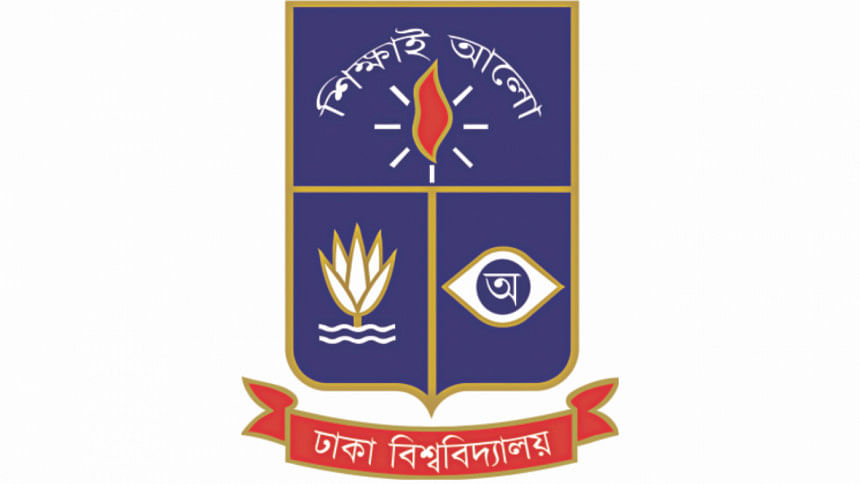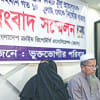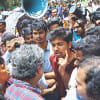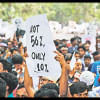No outsider allowed!

The Dhaka University authorities yesterday said no outsider will be allowed to roam or stay on the campus without prior permission, a move that goes against the very character of the country's premier university.
“The Dhaka University campus is open only to its students,” reads a press statement.
“Outsiders will not be allowed to roam or stay here or carry out any activities without permission of the authorities/proctor. If necessary, the authorities will seek help from law enforcers,” it said.
"Resident students of dormitories be directed that they refrain from initiating any activities (spreading rumours or making provocative comments) -- other than studies and co-curricular programmes -- that may hinder academic or normal life.”
The statement also asked provosts concerned to issue letters to those female students who recently demonstrated inside their halls in the dead of night and “hampered normal lives of other students”, and to make them cautious about their “responsibilities and duties” of hall life.
The move decided at a provost committee meeting on July 5 raised a volley of questions like whether common people now can visit the DU, an institution which gave birth to some major democratic movements and has historic and religious establishments on its campus.
Located at the heart of the capital, the DU campus has no boundary wall. There are several roads that crisscross the campus, leading to Dhaka Medical College Hospital, Buet and the High Court.
Besides, the step comes at a time when the university has become the centre point of the ongoing movement for reforming the existing quota system in public service with students from other educational institutions in Dhaka and jobseekers taking part in it.
"The authorities have made such decisions aiming at stopping our movement," Hasan Al Mamun, convener of Bangladesh Sadharan Chhatra Odhikar Sangrakkhan Parishad, a platform that spearheaded the quota demos.
"Students have the right to take part in any democratic movement. The university authorities can't put restriction on any student. The glorious movements of 1952, 1966 and 1969 would not have been possible had there been such restrictions,” he told The Daily Star last night.
The DU statement said the provost committee held the meeting against the backdrop of "untoward incidents inside the campus centring the quota reform movement” and to assess the overall situation at the university.
The quota reformists came under attacks by Bangladesh Chhatra League men on the campus with the university administration remaining silent on this issue.
To add insult to the injuries, the DU vice-chancellor on Sunday compared the activities of quota reformists with that of Islamist militant outfits like the Taliban and Al-Shabaab.
With DU VC Prof Md Akhtaruzzaman as its chief and Proctor AKM Golam Rabbani proctor its member secretary, the committee decided not to allow any “non-student” to stay in the halls.
It directed the hall authorities to issue notices asking “non-students” to leave immediately.
“If necessary, the hall authorities will seek help from law enforcers. Any guardian or guest won't be allowed to stay in the halls without permission,” reads the statement.
The provost committee meeting asked the proctor and the hall administrations to remain alert about whether anyone on the campus and in halls is "involved in the activities of any banned outfit or in spreading fanaticism".
"The hall authorities have to remain alert and active so that members of any banded organisation or fanatics cannot enter any hall. In this regard, the hall authorities will hold view exchange meeting with the students and student organisations regularly," it said.
Prof Mahbubul Alam Zoarder, provost of Salimullah Muslim Hall, said, “We won't allow any activities that can hinder studies of students -- be it any movement of a political organisation or quota reform protests."
In the wake of BCL attacks on quota protesters, students of Shamsunnahar and Rokeya halls on the night of July 4 demonstrated inside the dormitories, demanding a safe campus.
Contacted, DU Proctor Prof Rabbani said they have taken such decisions “to ensure security on the campus".
Asked whether a visitor needs to take permission before visiting historically important places on the campus like the Central Shaheed Minar, the grave of National Poet Kazi Nazrul Islam, Shikh prayer hall Gurdwara Nanak Shahi, Bangla Academy and Madhur Canteen, the proctor said, “No”.
"They can visit. We will give assistance to them as visitors if we feel it necessary. But they also will also have to assist us."
Asked how you will distinguish a visitor and an outsider, he evaded a direct answer.
"You know there is definition of outsider. Age is another indication to identify outsiders. We are aware of the age of our students. There are many ways to verify it [who is a visitor and who an outsider],” he said.
In October last year, the DU authorities asked all the TSC-based socio-cultural organisations to finish their activities by 8:00pm. But it retreated from the decision following huge criticism and protest.
In January this year, all makeshift stalls on the campus were ordered to shut down to “ensure hygienic food, security and proper environment for education”. The authorities backtracked from its position following criticism. 64545454544

 For all latest news, follow The Daily Star's Google News channel.
For all latest news, follow The Daily Star's Google News channel. 







Comments